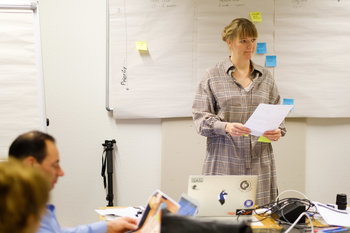
Self-Control
The ability to control your behavior and direct your thinking towards a goal. This includes an ability to suppress or redirect negative or unproductive emotions. For example, the ability to continue to drive well when other drivers are making you angry.Introspection
Introspection is the ability to examine your own thoughts, emotions and character to change in productive ways. For example, the ability to identify flaws in your thinking such as motivated reasoning.Self-Direction
The ability to make reasonable decisions in a timely manner in an environment of uncertainty. This implies that you can make decisions and act without any input from others if this is required. For example, a new hire who thrives in a competitive and fast moving organization without any direction from their boss or team.Focus & Endurance
The ability to focus on work, study, listening and anything else that demands attention and to maintain this focus over time. For example, a student who is able to efficiently read a book cover-to-cover they don't find particularly interesting in order to complete a book report.Habit & Routine
Habit and routine are tools of self-discipline whereby an individual repeats a productive behavior. For example, a person who wants to maintain a healthy body weight who has a habit of jogging each morning.Will Power
The ability to overcome negative behaviors and habits despite a strong motivation to continue the behavior.Principled Behavior
The ability to conform to a set of values and principles. Generally speaking, it is easy to think of values that you admire but difficult to live up to values in a consistent way. For example, you may believe in the golden rule of treating people as you yourself would like to be treated but it is easy to lose your patience with those around you or fail to see their perspective. Matching your behavior to your values is a high form of behavior that takes a great deal of self-discipline to master.Personal Resilience
Personal resilience is the ability to retain your discipline in the face of significant stress. For example, the ability to handle difficult criticism that generates strong emotions without acting out in a negative way.Stoicism
Stoicism is an ideal that states that misfortune or difficulties need not affect your happiness because it is only your response that matters. In theory, a stoic is unmoved by circumstances whether positive or negative as they are only interested in their own disciplined and virtuous response to each situation.Notes
Stoicism is a philosophy founded in the 3rd century BC that has had a profound influence on Western civilization as an ideal or virtue. Stoicism is based on the idea that individuals have significant agency and aren't victims of circumstance. It calls for quietly dealing with problems without complaint. This was widely challenged beginning in the 1960s with the idea that it is important to socialize your feelings about every fortune and misfortune. This originates with the popular psychology that it is harmful to keep your feelings bottled up.| Overview: Self-Discipline | ||
Type | ||
Definition | An ability to do things that are difficult or unpleasant without anyone pushing you or offering you incentives. | |
Related Concepts | ||






























